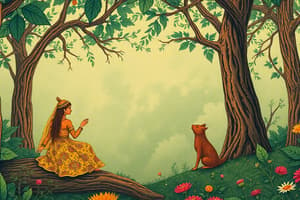Podcast
Questions and Answers
Who is considered the father of modern Gujarati poetry?
Who is considered the father of modern Gujarati poetry?
- Narmadashankar Lagu
- Dalpatram (correct)
- Vajra
- Hemachandra
Which genre of Gujarati literature consists of epic tales fusing mythology and history?
Which genre of Gujarati literature consists of epic tales fusing mythology and history?
- Padyolik
- Sudraka's Vasavadatta
- Kavyas (correct)
- Modern works
What type of works do Gopaldas Savla, Jayesh Shah, and Mansukhbhai Desai create in Gujarati literature?
What type of works do Gopaldas Savla, Jayesh Shah, and Mansukhbhai Desai create in Gujarati literature?
- Modern works (correct)
- Epic tales
- Padyolik
- Historical narratives
How does Gujarati literature blend various cultural influences?
How does Gujarati literature blend various cultural influences?
What contributes to the uniqueness of Gujarati literature within South Asian writings?
What contributes to the uniqueness of Gujarati literature within South Asian writings?
How do contemporary Gujarati novelists, poets, and playwrights engage with their work?
How do contemporary Gujarati novelists, poets, and playwrights engage with their work?
During which dynasty is it believed that the Gujarati language evolved?
During which dynasty is it believed that the Gujarati language evolved?
Which script influenced the development of Gujarati script due to Persian influence?
Which script influenced the development of Gujarati script due to Persian influence?
Which author is known for influencing the Bhakti movement through his devotional poems in Gujarati literature?
Which author is known for influencing the Bhakti movement through his devotional poems in Gujarati literature?
Who is known for depicting rural life through short stories in Gujarati literature?
Who is known for depicting rural life through short stories in Gujarati literature?
In which century did Narsinh Mehta, an influential figure in Gujarati literature, live?
In which century did Narsinh Mehta, an influential figure in Gujarati literature, live?
What was the early form of writing in the Gujarati script that dates back to ancient texts like Mahabharata and Ramayana?
What was the early form of writing in the Gujarati script that dates back to ancient texts like Mahabharata and Ramayana?
Study Notes
Exploring Gujarati: A Fascinating Language and its Literary Tradition
The vibrant state of Gujarat in western India is home to the Gujarati language, which has been shaping countless aspects of culture, including a rich literary heritage. As you delve into this world of Gujarati literature, let's shed light on some fascinating facets.
Origins and History
While the exact origins of Gujarati remain unclear, it's believed to have evolved from Old Indo-Aryan languages around the 7th century CE during the rule of the Chaulukya Dynasty. Early forms of writing in the Gujarati script—Brahmi and Kharosthi—date back to ancient texts such as the Ardha-Magadhi Prakrit and the early Sanskrit works like Mahabharata and Ramayana. By the medieval period, the influence of Persian equated with Muslim conquerors led to the development of a new form of writing—Devanagari script, later evolving into what we now call Gujarati script.
Notable Authors and Genres
Throughout history, esteemed authors have contributed their unique perspectives to the evolution of Gujarati literature. Here are some significant names and genres:
- Narsinh Mehta (1414–1481): Regarded as one of the most revered saints, his devotional poems penned in simple language directly influenced the Bhakti movement, resonating deeply with Hindu readers.
- Pragnanchand Sarvaiyaa (1904–1973): His depiction of rural life through short stories earned him recognition among critics.
- Dalpatram (1820–1866): Considered the father of modern Gujarati poetry due to his expressive lyrics about everyday events and emotions.
- Kavyas: Epic tales often fusing mythology and history, exemplified by masterpieces like Sudraka's Vasavadatta, Vajra's Nilamatsupurana, Hemachandra's Trishastisalakapurushacarita, and Narmadashankar Lagu's Siddhhantkuth.
- Padyolik: Songs and poems sang aloud during social gatherings, ceremonies, and festivals.
Modern works also garner attention, with prolific writers like Gopaldas Savla, Jayesh Shah, and Mansukhbhai Desai making their mark across various genres.
Influences and Impact
Influenced by classical Indian literature (e.g., Sanskrit) and foreign sources (Persian, Arabic), Gujarati literature encompasses multiple styles, themes, and tones—absorbing and innovatively interpreting these influences for centuries. This blending fosters creativity, resulting in diverse narratives that reflect local customs, traditions, and experiences while simultaneously addressing universal human concerns. The development of a distinct dialect that reflects both regional roots and the impact of colonialism further solidifies the uniqueness of Gujarati literature within the broader scope of South Asian writings.
As Gujarati literature continues to evolve, contemporary novelists, poets, and playwrights engage global issues while maintaining connections to traditional values. Despite challenges, Gujarati remains a vital medium for self-expression, learning, and preserving cultural identity.
Studying That Suits You
Use AI to generate personalized quizzes and flashcards to suit your learning preferences.
Description
Dive into the world of Gujarati literature, tracing its origins from ancient scripts to the modern era. Explore the notable authors, genres, and the rich literary tradition that showcases a blend of classical Indian and foreign influences.




